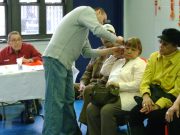Building strong bones in children is an essential foundation for a lifetime of health and well-being. As parents and caregivers, we want nothing more than to see our children grow up healthy and resilient, ready to take on the world. However, in the hustle and bustle of daily life, ensuring that our little ones receive the nutrients and care they need for optimal bone development can often be overlooked. This article aims to guide you through the key steps and considerations for fostering strong bones in your children, blending expert advice with practical, everyday tips. With empathy and understanding, we will explore the importance of nutrition, physical activity, and lifestyle choices that together form the backbone of your child’s skeletal health. Let’s embark on this journey to nurture strong, healthy bones that will support your child’s growth and adventures for years to come.
Importance of Early Bone Health for Lifelong Strength
Establishing a foundation of strong bones in childhood is crucial for lifelong health and resilience. Children’s bones are growing and developing rapidly, making it an ideal time to instill habits that promote bone strength. Here are some key strategies:
- Nutrition: A balanced diet rich in calcium and vitamin D is essential. Foods like dairy products, leafy greens, and fortified cereals can significantly contribute to bone health.
- Physical Activity: Encourage weight-bearing exercises such as jumping, running, or dancing. These activities stimulate bone formation and increase bone density.
- Avoiding Harmful Substances: Limiting children’s exposure to tobacco smoke and excessive caffeine can protect their developing bones from potential harm.
To better understand how these elements contribute to bone health, consider the following table:
| Factor | Impact on Bone Health |
|---|---|
| Calcium-Rich Diet | Increases bone density |
| Regular Exercise | Strengthens bones through mechanical stress |
| Avoiding Tobacco | Prevents bone weakening |
By fostering these habits early on, we can set children up for a lifetime of strong and healthy bones, reducing the risk of fractures and bone-related diseases in the future. Remember, nurturing bone health in childhood lays the groundwork for a robust and active life.

Nourishing Young Bones with the Right Nutrients
Building a strong skeletal foundation for children involves ensuring they receive the right blend of nutrients. Key players in bone health include calcium, vitamin D, and phosphorus. Calcium, a primary building block of bone tissue, can be found in dairy products like milk, cheese, and yogurt, as well as in fortified plant-based milks and leafy green vegetables. Vitamin D, essential for calcium absorption, can be sourced from sunlight exposure and foods like fatty fish and fortified cereals. Phosphorus, which works in tandem with calcium, is abundant in foods such as meat, fish, and eggs.
Here are some nutrient-rich foods that support bone health in children:
- Dairy Products: Milk, cheese, yogurt
- Leafy Greens: Kale, spinach, broccoli
- Fish: Salmon, sardines
- Nuts and Seeds: Almonds, chia seeds
- Fortified Foods: Cereals, plant-based milks
To help you easily incorporate these nutrients into your child’s diet, consider the following daily meal plan:
| Meal | Food | Nutrients |
|---|---|---|
| Breakfast | Oatmeal with almond milk and fresh berries | Calcium, Vitamin D, Phosphorus |
| Lunch | Grilled salmon with a side of broccoli | Calcium, Vitamin D, Phosphorus |
| Snack | Greek yogurt with chia seeds | Calcium, Phosphorus |
| Dinner | Chicken stir-fry with kale and bell peppers | Calcium, Phosphorus |

Encouraging Physical Activities for Optimal Bone Development
Fostering an active lifestyle in children is pivotal for their bone health. Engaging in various physical activities not only enhances bone density but also instills lifelong healthy habits. Here are some enjoyable and effective ways to promote bone strength:
- Jumping and Running: Activities like jumping rope or playing tag are excellent for stimulating bone growth due to the impact they provide.
- Team Sports: Encourage participation in sports like soccer, basketball, or gymnastics. These sports combine weight-bearing movements with fun and teamwork.
- Dance and Martial Arts: These activities improve balance, flexibility, and strength, contributing to better bone health.
| Activity | Bone Benefit |
|---|---|
| Jumping Rope | Increases bone density |
| Soccer | Improves bone strength |
| Dance | Enhances balance and coordination |
Remember, consistency is key. Aim for at least an hour of physical activity each day to ensure that your child’s bones develop optimally. Make it a family affair by joining in and creating an environment where physical activity is both a fun and essential part of daily life.

Creating a Supportive Environment for Healthy Growth
Ensuring children have the right environment to support their bone health is crucial. A combination of proper nutrition, physical activity, and healthy lifestyle choices creates a nurturing setting for their growth. Here are some practical ways to foster a supportive environment:
- Nutritious Diet: Incorporate calcium-rich foods such as dairy products, leafy greens, and fortified cereals into meals. Vitamin D is also essential for calcium absorption, so include foods like fish, egg yolks, and fortified milk.
- Encourage Physical Activity: Promote activities that involve weight-bearing exercises such as jumping, running, or dancing. These activities stimulate bone growth and strengthen muscles.
- Limit Screen Time: Encourage children to spend more time outdoors engaging in physical play rather than sitting for long periods in front of screens.
| Essential Nutrient | Sources | Benefits |
|---|---|---|
| Calcium | Milk, Cheese, Yogurt | Builds strong bones and teeth |
| Vitamin D | Sunlight, Fish, Fortified Milk | Enhances calcium absorption |
| Protein | Meat, Eggs, Beans | Supports bone growth and repair |
Additionally, it’s important to cultivate a positive mindset towards health and wellness in children. Celebrate their efforts in maintaining a healthy lifestyle and provide encouragement to help them build habits that will benefit them for a lifetime.








































